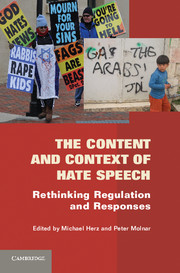Book contents
- Frontmatter
- Contents
- Contributors
- Foreword: Hate Speech and the Coming Death of the International Standard before It Was Born (Complaints of a Watchdog)
- Foreword: Hate Speech and Common Sense
- Acknowledgments
- Introduction
- Part I Overviews
- Part II Refinements and Distinctions
- Part III Equality and Fear
- 16 Hate Speech and Political Legitimacy
- 17 Reply to Jeremy Waldron
- 18 Waldron, Machiavelli, and Hate Speech
- 19 Shielding Marginalized Groups from Verbal Assaults Without Abusing Hate Speech Laws
- 20 Interview with Nadine Strossen
- 21 Interview with Theodore Shaw
- Part IV International Law
- Index
- References
17 - Reply to Jeremy Waldron
Published online by Cambridge University Press: 05 June 2012
- Frontmatter
- Contents
- Contributors
- Foreword: Hate Speech and the Coming Death of the International Standard before It Was Born (Complaints of a Watchdog)
- Foreword: Hate Speech and Common Sense
- Acknowledgments
- Introduction
- Part I Overviews
- Part II Refinements and Distinctions
- Part III Equality and Fear
- 16 Hate Speech and Political Legitimacy
- 17 Reply to Jeremy Waldron
- 18 Waldron, Machiavelli, and Hate Speech
- 19 Shielding Marginalized Groups from Verbal Assaults Without Abusing Hate Speech Laws
- 20 Interview with Nadine Strossen
- 21 Interview with Theodore Shaw
- Part IV International Law
- Index
- References
Summary
Professor Waldron believes that I beat a “precipitate retreat” from an earlier position in an email to him commenting on an argument he made. He has called my “bluff” and resisted my “browbeating.” I did not intend the email for publication, but I cannot find any retreat there. I had said, in the “Foreword” Waldron cites, that a law criminalizing “hate” speech “spoils the democratic justification we have for insisting that everyone obey.” I said, in the email Waldron decided to quote, that such laws leave us with “something morally to regret” and with “a deficit in legitimacy.” In an earlier book Waldron cites, I said that legitimacy is a matter of degree, and that not every law that is “spoiled” by a defective democratic process justifies citizen rebellion. Claiming that an opponent has retreated is often a useful rhetorical device, but it seems unpersuasive in this case. We can hardly justify a defect in political legitimacy by arguing that it might have been worse.
Waldron appears to accept, at least in this essay, that it is indeed a defect in legitimacy to enforce legislation against those who were not permitted to speak in opposition during the political process that produced that legislation, that this does “spoil” the democratic pedigree of the legislation to some degree. If the legislation in question required everyone to carry health insurance, for example, then suppression of even “vituperative” dissent would put the legitimacy of that law “in question.” He thinks hate speech different, apparently, for two reasons. One of these – that issues of racial dignity have been settled in mature democracies – is doubtful, and Waldron offers it with what seems great hesitation. Well he might: These issues seem much less settled now – in Germany and the Netherlands, for example, as well as in Britain and the United States – than they seemed decades earlier. The other reason Waldron offers is interesting, however; it touches a very deep issue in political philosophy. What is the basis of the “equal concern and respect” that coercive government owes those who fall under its dominion?
- Type
- Chapter
- Information
- The Content and Context of Hate SpeechRethinking Regulation and Responses, pp. 341 - 344Publisher: Cambridge University PressPrint publication year: 2012
References
- 7
- Cited by

